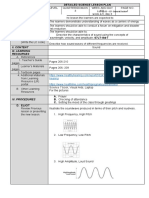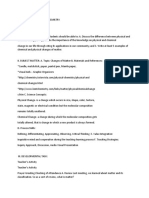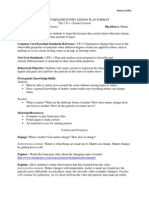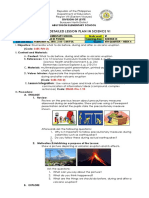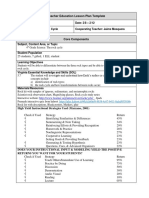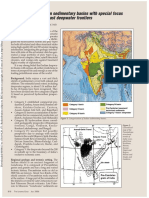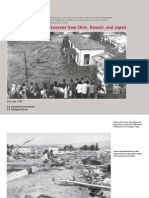Science Ecosystem
Science Ecosystem
Uploaded by
kundiwow2000Copyright:
Available Formats
Science Ecosystem
Science Ecosystem
Uploaded by
kundiwow2000Copyright
Available Formats
Share this document
Did you find this document useful?
Is this content inappropriate?
Copyright:
Available Formats
Science Ecosystem
Science Ecosystem
Uploaded by
kundiwow2000Copyright:
Available Formats
DETAILED LESSON PLAN IN SCIENCE VI
I. OBJECTIVES:
At the end of the lesson, the pupils are expected to;
1. Describe an ecosystem;
2. Identify the living and non-living components of an ecosystem.
3. Distinguish the kinds of ecosystem in the environment.
II. SUBJECT MATTER:
Module 14 ECOSYSTEMS
Reference: Exploring and Protecting our World
Value Integration: Caring for the Ecosystems
Skills: Identifying, Distinguishing, Describing
Materials: Cartolina, Book, pictures, visual aids
Concept: ECOSYSTEMS
III. PROCEDURE:
Teacher’s Activity Student’s Activity
A. PRELIMINARY ACTIVITIES
Good Morning Class. Good Morning Teacher.
Let us pray. All are praying…
a. Checking of attendance
Who are absent today? None Teacher.
Very good no absent.
b. Review
What was our topic that we discuss last meeting? One pupil will answer… Teacher our last topic
Anybody who can summarize? last meeting is about deforestation.
Very Good! Let’s clap our hands.
c. Motivation
Have you seen a rotten log? Yes teacher!
I have here an example of a rotten log.
What do you see in this rotten log?
(Each pupil will observe.)
Good job! Log, snail, moss, ants, fungi…
Now why I have shown this to you? You will
know it in our discussion.
d. Unlocking of difficulties
Before we start our lesson, let us first know the
meaning of some unfamiliar words that we may
encounter.
1. What is ecology?
Ecology is the relationships b/w organisms and
2. What are organisms? their environment.
Example: all animals and all plants, etc…
Organisms are plants, animals and other tiny
living things that may not be visible to the naked
eye.
3. What is a Habitat? Example: Humans, cat, dog, fungus, yeast,
bacteria, etc…
Habitat is the part of the ecosystem where an
organism lives.
B. LESSON PROPER Example: ocean, coral reefs, dessert, trees, etc…
a. Presentation of the Lesson
As you can see on the board, there is a word
posted here, everybody please read the word
‘’ECOSYSTEM’’. ‘’ECOSYSTEM’’
Now, what comes in to your mind when you hear
the word ECOSYSTEM? Write your answer on the
board. Anyone? The pupils will write their answers on the board.
Plants, Animals, biotic, abiotic, etc…
Very Good!
Now let’s put it altogether what is an ecosystem?
(The teacher will guide the pupils in answering the
question.) Ecosystem is a specific place where living things
interact with non-living things. It comes from the
word ecological system or ecology from the
Greek word which means ‘’HOME’’.
b. Analysis and Discussion
Try to recall of what do you see in a river or sea
or forest (or any ecosystem existing in the (The pupils will answer.)
community)? Cat, Dog, Humans, Chickens, frogs, snakes, fish,
ants, garbage, fish ponds, grass land, etc.
Well done!
There are two components of an ecosystem;
1. Biotic Factors
2. Abiotic Factors
Biotic Factors are all organisms that live in an
ecosystem or living things in short.
Give me an example of biotic factors.
Very good! Let’s give him/her a YES CLAP for all Plants, animals, fish, whale, shark, dog, cat,
of us! humans, mouse, lizard, birds, etc…
Plants, animals, humans, etc…
(The Pupils will clap.)
Abiotic Factors are all the non-living components
of an ecosystem.
Can you please give me an example of abiotic
factors?
Excellent! Let’s give him/her a WHISTLE BOMB Sunlight, Air, Water, Soil, Temperature, Minerals,
CLAP! and others.
There are 2 kinds of an ecosystem, which is small
and big ecosystem, some lived in sea and others
lived on land.
Example of a Small ecosystem is a rotten log
which I present to you a while ago. Another is a
tree, a plotted plant, and etc. While Big ecosystem
– ocean, forest, etc…
(Show an example of a forest.)
Can you follow?
c. Generalization
Let’s sum up what we have discussed; I have here
a graphic organizer. All you need to do is to Yes teacher!
provide the details for each box. Now anyone who
can answer?
Very Good! ECOSYSTEM is made up of living and non-
living things interacting with each other. And is
Now, who can tell us the summary of our lesson derived from the Greek word meaning HOME.
for today with the help of the graphic organizer? And it can be small or big ecosystem which some
lived in land and lived in sea.
C. POST ACTIVITIES
a. Group Activity
Ecosystem in a Bottle
Divide the class into two groups, have each
group build their own "ecosystem" inside of a small
container such as a can or large glass jar. Identify
the problems that each Ecosystem may encounter.
Let them report on the Ecosystems that they made.
How do you find the activity class?
Why do you say so?
Have you learned the lesson? (The pupils will be divided into two groups and
perform the activity.
b. Application
I find it very excited because all are actively
Now that we have understood Ecosystem, do you participating and they enjoy the activity….
think Ecosystem is important to us?
Yes teacher!
Why?
c. Value Integration
If this is very important, how can we take care of
our ecosystem? The pupils will answer on the board…
Can you give me how can we take care our
ecosystem?
Yes teacher.
Ecosystem is very important to us because it
sustain our needs, the plants and animals and
other non-living things that interact to living
things in the environment.
(Pupil will answer.)
By preserving our Ecosystem, not destroying any
Ecosystems, etc…
IV. EVALUATION
A. Identify if what kind of ecosystem is given below. Put the word Small if the kind of
ecosystem is small and Big if the kind of Ecosystem is big on the space provided.
______ 1. Sea _______ 6. Mangroves
______ 2. Rotten log _______ 7. A pond
______ 3. Grassland _______ 8. A Fern
______ 4. Forest _______ 9. A Plant
______ 5. Coral Reefs _______ 10. A dessert
B. Describe an ecosystem in your own understanding.(5pts.)
V. ASSIGNMENT
1. Give ways on how we can preserve our ecosystem.
2. Study the role and relationship in an ecosystem.
You might also like
- 4 A Lesson PLan RevisedDocument7 pages4 A Lesson PLan RevisedChrismarie Mae PanoyNo ratings yet
- Perante LessonplanDocument6 pagesPerante LessonplanJelaine Infante RegulaNo ratings yet
- Muscular SystemDocument5 pagesMuscular SystemBNo ratings yet
- LP Grade 8 MolaveDocument19 pagesLP Grade 8 MolaveBlessing Shielo VicenteNo ratings yet
- DLP Science Q2 W4Document6 pagesDLP Science Q2 W4Julieann MarceloNo ratings yet
- Lesson Plan - EarthDocument3 pagesLesson Plan - EarthMa. Christina GarciaNo ratings yet
- Comets Asteroids Meteors FinalDocument4 pagesComets Asteroids Meteors FinalYasmin Abigail AseriosNo ratings yet
- A Detailed Lesson Plan in Science 11Document18 pagesA Detailed Lesson Plan in Science 11Ruby Jane EslitNo ratings yet
- LAyersDocument4 pagesLAyersMarlyn ClaroNo ratings yet
- Lesson Plan Sound Waves - 3Document5 pagesLesson Plan Sound Waves - 3Mitchie GeraldinoNo ratings yet
- Lesson Plan in Science 7: Objectives A. Most Essential Learning Competency: (MELC) B. Code: C. Learning ObjectivesDocument6 pagesLesson Plan in Science 7: Objectives A. Most Essential Learning Competency: (MELC) B. Code: C. Learning ObjectivesLiezl BallesterosNo ratings yet
- 5E Lesson Plan Template: Teacher Deonica MatthewsDocument3 pages5E Lesson Plan Template: Teacher Deonica Matthewsapi-532358629100% (1)
- Lesson Plan in Metal and Non MetalsDocument4 pagesLesson Plan in Metal and Non MetalsmarcNo ratings yet
- Final Demo Natural ResourcesDocument16 pagesFinal Demo Natural ResourcesStephany Mae CanoyNo ratings yet
- Lesson Plan in Science 7Document5 pagesLesson Plan in Science 7John Nino OsorioNo ratings yet
- Activity and Lesson Plan in Layers of AtmosphereDocument4 pagesActivity and Lesson Plan in Layers of AtmosphereTeresa Marie Yap CorderoNo ratings yet
- B. Objectives:: A Detailed Lesson PlanDocument7 pagesB. Objectives:: A Detailed Lesson PlanYona makaneryNo ratings yet
- DETAILED LESSON PLAN IN Solution Grade 7Document14 pagesDETAILED LESSON PLAN IN Solution Grade 7clyseyvonnevillaluzNo ratings yet
- Lesson Plan in ScienceDocument7 pagesLesson Plan in ScienceJhun Dalingay DumaumNo ratings yet
- LANDMASSES AND BODIES OF WATER Simple Detailed Lesson PlanDocument5 pagesLANDMASSES AND BODIES OF WATER Simple Detailed Lesson PlanMonica Grace ManaloNo ratings yet
- Lesson Plan in Science - FaultDocument7 pagesLesson Plan in Science - FaultCharlotte LandichoNo ratings yet
- A Detailed Lesson Plan in Science 7Document7 pagesA Detailed Lesson Plan in Science 7Gabriela FernandezNo ratings yet
- Lesson Plan Seasons in The Philippines 3Document2 pagesLesson Plan Seasons in The Philippines 3Edessa MasinasNo ratings yet
- Q4 Science 7 Week3Document4 pagesQ4 Science 7 Week3bry kaligayahanNo ratings yet
- Motion DetectorsDocument28 pagesMotion Detectorsapi-668571149No ratings yet
- DLP 7 Sea, Land Breeze and MonsoonsDocument7 pagesDLP 7 Sea, Land Breeze and MonsoonsMisty MamintaNo ratings yet
- 3rd-7e's - LOCATING PLACESDocument3 pages3rd-7e's - LOCATING PLACESRod ReyesNo ratings yet
- Detailed Lesson Plan DraftDocument3 pagesDetailed Lesson Plan DraftKim Paulo Soco100% (1)
- Grade 7Document36 pagesGrade 7Yanika BarasNo ratings yet
- Detailed Lesson Plan in ChemistryDocument11 pagesDetailed Lesson Plan in Chemistrylavelyn balanNo ratings yet
- Science Matter Lesson PlanDocument2 pagesScience Matter Lesson Planapi-218287701100% (1)
- DLP Motion in Graph and DotsDocument9 pagesDLP Motion in Graph and DotsJohn PaulNo ratings yet
- Detailed Lesson Plan in Grade 7 Science Describing Motion: Mariano Ponce National High SchoolDocument9 pagesDetailed Lesson Plan in Grade 7 Science Describing Motion: Mariano Ponce National High SchoolMaximus MendozaNo ratings yet
- My Daily Lesson Plan-Cells - Gender Sentivity ApplicationDocument4 pagesMy Daily Lesson Plan-Cells - Gender Sentivity ApplicationShe EnaNo ratings yet
- Latitude and LongitudeDocument2 pagesLatitude and LongitudeApril Rose AyubanNo ratings yet
- LESSON PLAN Carbon CycleDocument6 pagesLESSON PLAN Carbon CycleGemay DanglayNo ratings yet
- Absolor DLL Sound WavesDocument3 pagesAbsolor DLL Sound WavesMariea Zhynn IvornethNo ratings yet
- 7es DLP For COT 2 2023 2024Document16 pages7es DLP For COT 2 2023 2024Mary Jean BalentozaNo ratings yet
- SEMI DETAILED LESSON PLAN in Sounding BoxDocument3 pagesSEMI DETAILED LESSON PLAN in Sounding BoxHarvey Jerome Del CampoNo ratings yet
- Science 5 RevisedDocument14 pagesScience 5 RevisedJen Perven JaconesNo ratings yet
- A Detailed Lesson Plan in Grade 4 DemoDocument7 pagesA Detailed Lesson Plan in Grade 4 DemoCindy Pableo SantosNo ratings yet
- LP in Science 3Document8 pagesLP in Science 3Cristine Mae TumamaoNo ratings yet
- Detailed Lesson Plan in Science 4 and T Fil 2Document6 pagesDetailed Lesson Plan in Science 4 and T Fil 2sheen sanong100% (1)
- 4 A's Lesson Plan in ScienceDocument8 pages4 A's Lesson Plan in ScienceMerry Grace TamundongNo ratings yet
- DLP in Science (Chemistry and Biology)Document8 pagesDLP in Science (Chemistry and Biology)Ana Rose OcfemiaNo ratings yet
- A Detailed Lesson Plan in Science Grade 7: Date: February 10, 2020 Time: Saturn 10:00-11:00/mercury 11:00-12:00Document5 pagesA Detailed Lesson Plan in Science Grade 7: Date: February 10, 2020 Time: Saturn 10:00-11:00/mercury 11:00-12:00jen mcbrideNo ratings yet
- Lesson Plan in Science Grade7Document7 pagesLesson Plan in Science Grade7Leopoldo Cosino100% (1)
- Lesson Plan in Chapter 9Document13 pagesLesson Plan in Chapter 9Jhun Lerry TayanNo ratings yet
- Science LPDocument3 pagesScience LPEva Reataza Acero-Odtujan100% (1)
- DLP 5E 1.1 - Science Is Part of Daily LifeDocument2 pagesDLP 5E 1.1 - Science Is Part of Daily LifeTc FaridahNo ratings yet
- Rock Cycle Lesson PlanDocument2 pagesRock Cycle Lesson Planapi-306447547No ratings yet
- Lesson Plan in Science 7Document10 pagesLesson Plan in Science 7Maricel AlcoyNo ratings yet
- SEA BREEZE AND LAND BREEZE Simple Detailed Lesson PlanDocument3 pagesSEA BREEZE AND LAND BREEZE Simple Detailed Lesson PlanMonica Grace ManaloNo ratings yet
- Detailed Lesson Plan in Science Grade 4Document4 pagesDetailed Lesson Plan in Science Grade 4Anna Mae Buenavista CabungcagNo ratings yet
- Marin - Lesson 20 Understand The Effect of The Earth - S Rotation On The Occurrence of Day and NightDocument8 pagesMarin - Lesson 20 Understand The Effect of The Earth - S Rotation On The Occurrence of Day and NightReynanNo ratings yet
- Science 7 Lesson PlanDocument39 pagesScience 7 Lesson PlanIra MontillaNo ratings yet
- Detailed Lesson Plan FormatDocument6 pagesDetailed Lesson Plan FormatMarylyn TabaquiraoNo ratings yet
- Biotic/Abiotic ActivityDocument2 pagesBiotic/Abiotic ActivityzimmermanscienceNo ratings yet
- Characteristics of Light March 20Document3 pagesCharacteristics of Light March 20Jasmin Japzon SeballosNo ratings yet
- Detailed Lesson Plan in Science ViDocument5 pagesDetailed Lesson Plan in Science ViBenazir FuadNo ratings yet
- Legal Issues Relating To Various Types of Baselines Allowed in The Law of The Sea Irfan Arafat Siam 222110004Document11 pagesLegal Issues Relating To Various Types of Baselines Allowed in The Law of The Sea Irfan Arafat Siam 222110004Irfan ArafatNo ratings yet
- Soal Uts Bahasa Inggris Kelas 6 Semester 2Document3 pagesSoal Uts Bahasa Inggris Kelas 6 Semester 2labrigid9267% (3)
- Anticyclone and Other Pressure SystemsDocument18 pagesAnticyclone and Other Pressure SystemsSalvador Jr. Besares67% (3)
- DistrictSurveyReport01112022 SabarkathaDocument31 pagesDistrictSurveyReport01112022 Sabarkathaabhishek joshiNo ratings yet
- Geography Mock Test Form 2. Weather and Climate, Rocks.Document2 pagesGeography Mock Test Form 2. Weather and Climate, Rocks.Burney Burney100% (2)
- Water Supply Report For Water Resources EngineeringDocument37 pagesWater Supply Report For Water Resources EngineeringIan Ilo BollerNo ratings yet
- Biodiversity and The Healthy SocietyDocument17 pagesBiodiversity and The Healthy SocietyRubilyn sualogNo ratings yet
- Botol Gelap TerangDocument15 pagesBotol Gelap Terangerina aurelliaaNo ratings yet
- Science 1103618Document3 pagesScience 1103618wenhao.yuNo ratings yet
- 2021 June GeoDocument8 pages2021 June GeoTinashe MareyaNo ratings yet
- Geography Form 1 End Term 1 Exam 2021 Teacher - Co - .KeDocument6 pagesGeography Form 1 End Term 1 Exam 2021 Teacher - Co - .Keamisikelvine4No ratings yet
- Ugar (River)Document2 pagesUgar (River)sdbitbihacNo ratings yet
- New Elevation Data Triple Estimates of Global Vulnerability To Sea-Level Rise and Coastal OodingDocument12 pagesNew Elevation Data Triple Estimates of Global Vulnerability To Sea-Level Rise and Coastal OodingMusa Al'alaNo ratings yet
- Journal of Hydrology: Regional StudiesDocument9 pagesJournal of Hydrology: Regional StudiesAlejandra PardoNo ratings yet
- StudentworksampleDocument8 pagesStudentworksampleapi-709249336No ratings yet
- An Overview of Indian Sedimentary Basins With Special Focus On Emerging East Coast Deepwater FrontiersDocument10 pagesAn Overview of Indian Sedimentary Basins With Special Focus On Emerging East Coast Deepwater Frontiersshantanuril100% (1)
- Env 3105 Study ResourcesDocument65 pagesEnv 3105 Study ResourcesSajid HanifNo ratings yet
- WastelandDocument20 pagesWastelandNimson IdiculaNo ratings yet
- Class 9 Geography Chapter 4 Extra Questions and Answers ClimateDocument17 pagesClass 9 Geography Chapter 4 Extra Questions and Answers ClimateDebansh Sahu100% (1)
- USGSCircular 1187 Rev2005 SmallDocument24 pagesUSGSCircular 1187 Rev2005 SmallpourmecoffeeNo ratings yet
- 3 - The Landscape of Sri LankaDocument15 pages3 - The Landscape of Sri LankaRanuka Hewa-AmarappuligeNo ratings yet
- Two Marks OAI551 - Environment and Agriculture ALDocument34 pagesTwo Marks OAI551 - Environment and Agriculture ALSuganthiVasan75% (4)
- Term Paper - Hurricane SandyDocument9 pagesTerm Paper - Hurricane Sandyapi-242435504No ratings yet
- Air, Atmospheric Pressure and WindsDocument42 pagesAir, Atmospheric Pressure and WindsVishnu Prasad100% (1)
- Exj 307Document71 pagesExj 307Sharon RochelleNo ratings yet
- Our Other World: by Alana Sacks, Gaelen Murray and Willa HartlDocument33 pagesOur Other World: by Alana Sacks, Gaelen Murray and Willa HartlKarin GravinaNo ratings yet
- Sirohi District PPT. DSRDocument26 pagesSirohi District PPT. DSRSumit Kumar100% (1)
- SCIENCE 7 (Module 4th Quarter) 2021-2022)Document26 pagesSCIENCE 7 (Module 4th Quarter) 2021-2022)armand bayoran100% (1)
- Css Screening Test Preparation: World GeographyDocument102 pagesCss Screening Test Preparation: World Geographymir hassanNo ratings yet
- Toda HouseDocument28 pagesToda HouseKrishnasoorya P U100% (2)









